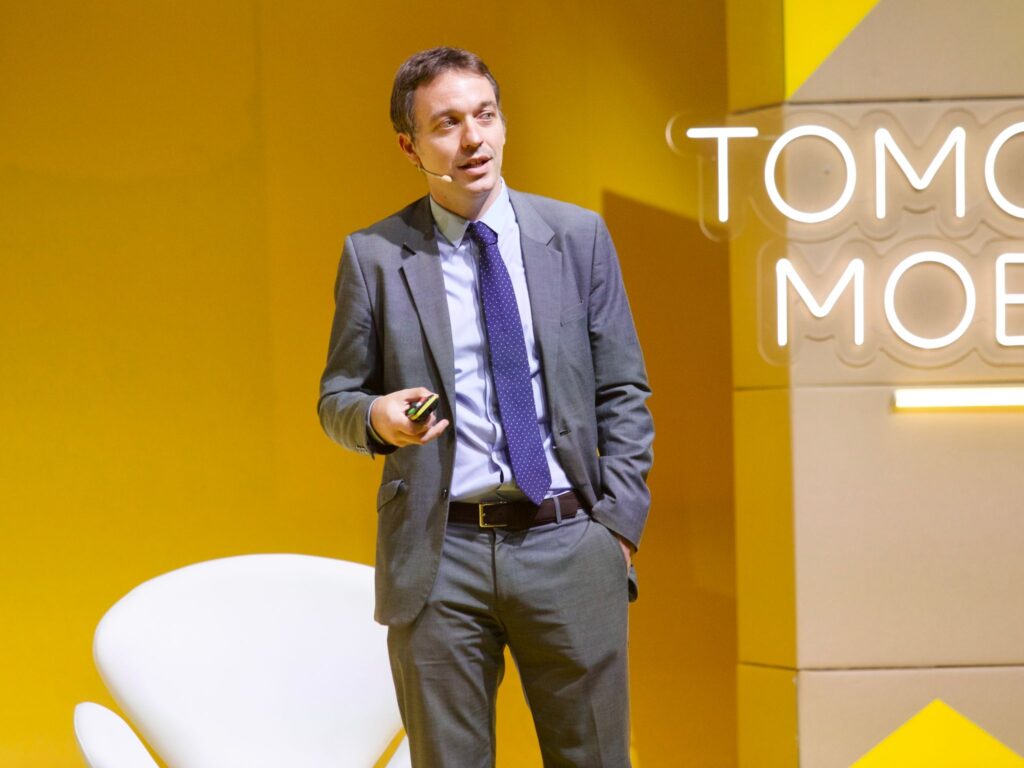Ramiro Pigem – Head of Tenders, Moventis
Mobility has become a fundamental pillar for society in the fight against climate change. This is a topic that has gradually begun to involve more and more sustainable technologies and eco-friendly practices, such as the promotion of electric vehicles, far more efficient public transport systems and the encouragement of such active forms of mobility as walking or cycling.
In spite of that, there is still progress to be made in the mobility and transport sector. The drastic increase in CO2 emissions over the last century – now in excess of 35 billion metric tonnes per year worldwide – has led to growing concerns around the impact from transport on climate change given that this sector is still responsible for approximately 25% of those emissions.
Exacerbated in the last three decades, this trend has highlighted the urgent need to approach the climate crisis from a mobility perspective as a sector with a priority and obligation to meet the targets of the UN’s 2030 Agenda and to make progress along a path that will enable it to achieve carbon neutrality by 2050.
But, what are the challenges that we face right now as operators, public authorities and users?
First of all, we need underlying infrastructure that is fit-for-purpose and to evolve at the same pace as all other stakeholders in this issue. That infrastructure needs to be well designed and accessible, and it needs to include charging stations for electric vehicles and an efficient public transport network. Such infrastructure will not only facilitate the transition over to cleaner means of transport but will also help to reduce traffic congestion, greenhouse gas emissions and air pollution, thereby improving quality of life in our cities and promoting a more sustainable future.
Another of the transport decarbonisation challenges lies in the search for alternatives other than electrification, as this approach is not suitable for all types of vehicles, especially those that travel long distances or require greater autonomy and range. Finding new models that can meet these specific needs, such as developing sustainable bio-fuels or optimising internal combustion engine efficiency, is therefore crucial.
Monitoring and assessing the decarbonisation process is also essential. This means deciding which data we want to extract from our operations, how we obtain them, how we manage them and how we interpret them. Obviously, how we analyse those data to anticipate future needs is also fundamental.
Besides developing new technologies and implementing them successfully, it is clearly essential to steer education and training in such a way that will build a qualified labour force capable of expediting the uptake of these innovations. This not only involves training for engineers but also in such fields as urban planning, efficient driving to maximise vehicle performance and soft skills to facilitate the transition over to new mobility models.
The interconnection of all these transport decarbonisation challenges converges on the need to set common goals that can drive planning and policy-making at both city and intercity levels. This will need incentives to be created to encourage the uptake of clean technologies, as well as effective coordination between the public and private sectors to foster innovation and investment in sustainable infrastructures. Establishing a clear and coherent regulatory framework, alongside proactive collaboration between various stakeholders, is essential to comprehensively tackling these transport challenges and making progress towards a more sustainable and resilient future.
Moventis TCC Pamplona, a pioneering company
Concerns around decarbonisation are nothing new at Moventia, which has been working for years on a future strategy capable of ensuring that its entire fleet of vehicles – both for collective mobility at Moventis and private mobility at Movento – shifts towards a more efficient scenario. In fact, the group has already made a major investment of 120 million euros on renewing its fleets between 2020 and 2023 alone.
Within this overarching group strategy, Moventis TCC Pamplona has emerged as a beacon of innovation and leadership in the field of transport decarbonisation, a division that has been on the cutting edge of low-emission technology and energy introduction over the last 12 years. This subsidiary has shown itself to be a model of excellence, carrying over 40 million passengers per year with a fleet of 160 buses. More importantly, it has done so with a firm focus on reducing its carbon footprint.
The journey taken by Moventis TCC Pamplona towards decarbonisation has passed a series of significant and pioneering milestones both in Spain and overseas. From the first trials involving electric buses in 2011 to the introduction of buses fuelled by compressed natural gas in 2022, the company has shown constant determination to explore and adopt new technologies. Furthermore, as part of a focus on the circular economy, it might even be possible to consider the possibility of harnessing local waste to produce biomethane; this being an inspiring example of how innovation can thrive in harmony with environmental sustainability.
One of the most outstanding moments on this journey was the decision in 2019 to exclusively operate a line with six rapid charging electric buses (line L9 between the university and the RENFE train station), an unprecedented milestone in Spain that marked a huge leap forward in the uptake of zero-emission vehicles. This visionary approach has been backed by such initiatives as the recent installation of new slow charging stations at depots and the incorporation of next-gen electric buses, driving forward the transition over to a carbon-neutral fleet even faster.
The results from these efforts are undeniable. Since 2014, Moventis TCC Pamplona has successfully reduced its carbon footprint by an impressive 17%, an achievement that highlights the positive and tangible impact of its decarbonisation initiatives. With its sights set firmly on the future, the company has committed to maintaining its leadership on the path towards cleaner and more sustainable transport. Its vision to reach carbon neutrality by 2030 in Pamplona is testament to its devotion to building a better world for future generations.
